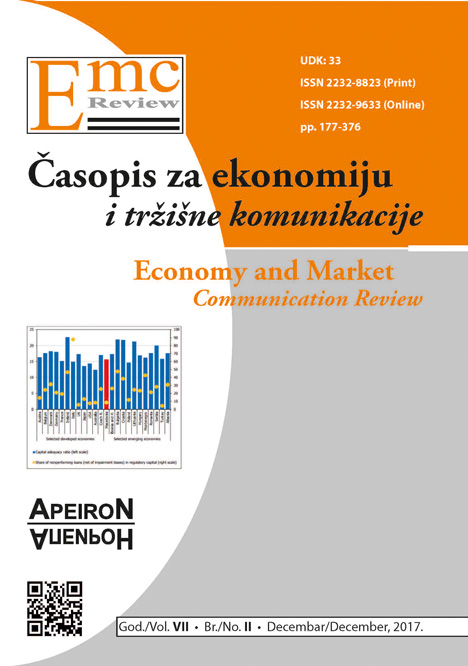EXPORTS, FOREIGN DIRECT INVESTMENTS AND ECONOMIC GROWTH IN THE REPUBLIC OF CROATIA // IZVOZ, INOZEMNA IZRAVNA ULAGANJA I EKONOMSKI RAST U REPUBLICI HRVATSKOJ
DOI:
https://doi.org/10.7251/EMC1702298FAbstract
Economic growth, export and foreign direct investment have been an important research subject for many years. The argument about the role of export as one of the main deterministic factors of economic growth has its roots in classical trade theories. Furthermore, according to the neoclassical theory, long-term economic growth is the consequence of an increase in exogenous factors such as increased labor force or technological progress. The export-led growth strategy of a country aims to provide incentives for the export of goods through various economic policy measures. Its goal is to increase the production of goods and services that can compete in the global market, use advanced technology and provide foreign exchange revenue needed to import capital goods. The emergence of new theoretical models that emphasize the importance of endogenous factors for economic growth has enabled the inclusion of foreign direct investment into analysis as one of growth determinants. Free movement of capital in the past was recorded only in a few countries and several sectors, and usually the capital flows followed the trade flows. Today there is a noticeable global trend of proliferation of free movement of capital. What is more, foreign direct investments have gained importance as desirable source of capital, especially in developing countries among which a strong competition for attracting such investments has developed. Foreign direct investments represent a specific form of capital because they imply a long-term interest as well as a certain share of ownership that ensures voting rights and participation in the management of the company. There is a vast literature dealing with the effects of foreign direct investment on the recipient country. It is generally accepted that these effects positively contribute to economic growth and development due to the inflow of fresh capital and spillover effects that depend on the absorption capacity of the recipient country. In conclusion, it is to be expected that liberalization of international trade and export performance, as well as the liberalization of capital movements and the inflow of foreign direct investment have a positive impact on the economic growth of a country. The aim of this paper is to examine the correlation between export, foreign direct investments and economic growth on the example of the Republic of Croatia. The conclusions of the research are of use in adopting appropriate policies and strategies for the growth and development of small open economies such as the Republic of Croatia.Downloads
Published
2017-12-21
Issue
Section
Чланци
